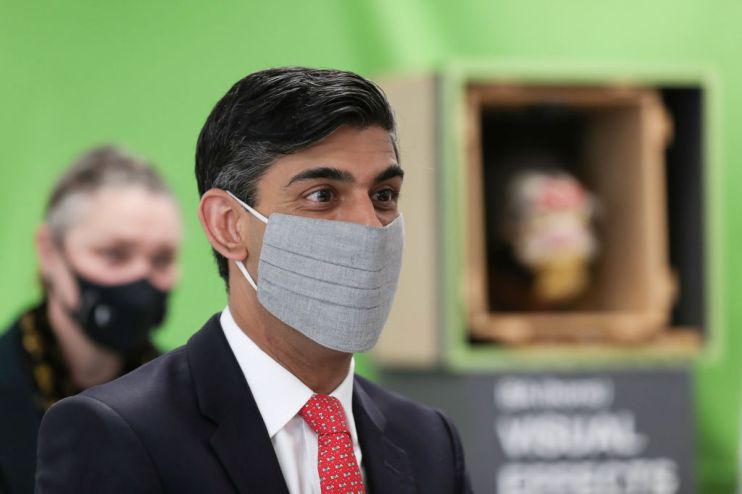Covid: Economic scaring to restrict Sunak from announcing giveaways in spending review

Long-standing damage inflicted on the UK economy by Covid and surging interest costs will restrict Rishi Sunak from announcing any giveaways in his upcoming spending review, according to new research published today.
Forecasts published by the Institute for Fiscal Studies, Britain’s leading independent microeconomic research institute, show the chancellor has little room to manoeuvre due to the economy suffering permanent scarring from the pandemic.
The IFS forecast that higher growth and rising tax receipts as a result will reduce borrowing this year by £30bn compared to estimates laid out in the March Budget.
Read more: Weekend Read: Job market tension threatens to derail Britain’s economic recovery
However, even with these reductions, Sunak will still need to borrow £203bn to fulfil his spending plans – a figure that has only be exceeded in two years since the second world war.
The Office for National Statistics is will publish its latest estimates for UK borrowing this morning.
The findings were set out in a new report called What does the changing economic outlook mean for the Spending Review?
Isabel Stockton, research economist at the IFS, said: “Our forecasts suggest the Chancellor has almost no additional wiggle room for permanent spending giveaways if he is to remain on course to deliver current budget balance.”
The forecasts lay bare the difficult fiscal decisions Sunak will need to make in the upcoming Spending Review.
The chancellor is under intense pressure to ramp up spending to help battered public services recover the impact of the Covid crisis.
The government’s existing spending plans imply cuts to some departments, and make no allowance for additional virus-related spending, the IFS warned.
Under his current spending plans, Sunak will have to spend up to £17bn less on public services per year than was planned before Covid.
Read more: Rishi Sunak hints he could block pension triple lock rise
The government’s fiscal watchdog the Office for Budget Responsibility said this month that the chancellor will need to find an additional £10bn per year for each of the next three years to combat additional pressure placed on the NHS, schools and transport by the pandemic.
But, beyond March next year, Sunak’s existing fiscal plans make no concessions for additional Covid-related spending as he seeks to put the public finances on a more sustainable path.
“Any permanent addition to these spending plans would – unless accompanied by another round of tax rises – on our forecasts mean higher levels of borrowing” the report said.
Stockton warned that additional spending on areas such as social care “would potentially require spending cuts elsewhere or further increases in tax.”
Mark Franks, director of welfare at the Nuffield Foundation, who funded the research said: “There is pressing demand for additional funding to support public services as they recover from the pandemic, both in the short and medium term.”
Read more: UK economy grows 0.8 per cent in May
Chancellor could afford short-term giveaways
Despite the bleak forecasts, the IFS said that the narrowing budget deficit could allow Rishi Sunak to sign off higher spending on areas struggling the most with the impact of Covid.
Sunak “could afford a short-term giveaway (such as more temporary funding for COVID catch-up) while staying within the path for borrowing set out in the March Budget” the report said.
However, areas that are most in need of funding require long-term support, meaning any additional spending “would extend far beyond this year.”
The IFS highlighted that the chancellor could increase spending to help public services such as schools, the NHS and local government recover from the pandemic.
UK economy to be smaller than pre-Covid size for several years
The IFS’ estimates, based on forecasts by investment bank Citi, show the UK economy will remain much smaller than its pre-pandemic size well into the coming decade.
The cash size of the economy is expected by Citi to be three per cent smaller by the middle of the decade compared to official pre-Covid forecasts.
Latest data from the ONS shows the UK economy grew 0.8 per cent in May.
Read more: UK fiscal watchdog puts cost of reaching net zero at £1.4 trillion